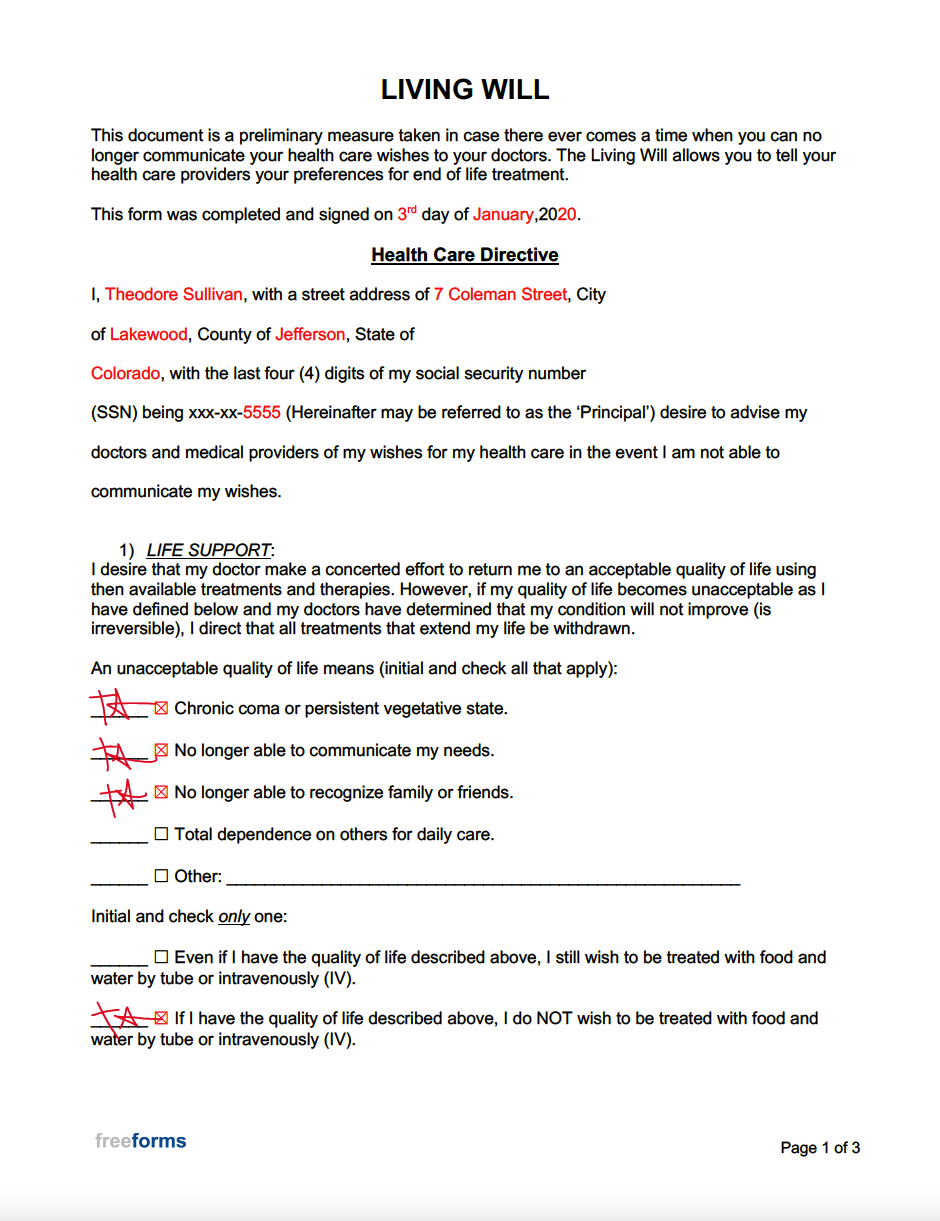A living will is written to indicate what one’s preferences are regarding medical decisions at the point of incapacitation (inability to communicate). When somebody doesn’t have a living will and is unresponsive due to illness or injury, it can cause distress to their family who may struggle with what their loved one would have wanted. By implementing this instrument, individuals can express how they feel about resuscitation, life-sustaining treatments, and the administering of certain medications.
Advance Directive – Becoming the standard document for health care planning, the advance directive contains a living will as well as a medical power of attorney so that individuals can also appoint a health care proxy to handle related matters for them when they cannot.
By State
- Alabama
- Alaska
- Arizona
- Arkansas
- California
- Colorado
- Connecticut
- Delaware
- Florida
- Georgia
- Hawaii
- Idaho
- Illinois
- Indiana
- Iowa
- Kansas
- Kentucky
- Louisiana
- Maine
- Maryland
- Massachusetts
- Michigan
- Minnesota
- Mississippi
- Missouri
- Montana
- Nebraska
- Nevada
- New Hampshire
- New Jersey
- New Mexico
- New York
- North Carolina
- North Dakota
- Ohio
- Oklahoma
- Oregon
- Pennsylvania
- Rhode Island
- South Carolina
- South Dakota
- Tennessee
- Texas
- Utah
- Vermont
- Virginia
- Washington
- West Virginia
- Wisconsin
- Wyoming
What Is a Living Will?
A living will, also referred to as a “declaration”, is a written instrument carried out by those who wish to express their preferences (in advance) concerning medical care at the time of incapacitation. The term “incapacitation” implies that the individual no longer has the ability to function and make their own choices due to health complications. This instrument is often carried out by the elderly, patients facing high-risk surgery, and the terminally ill. But, even if you are a young and healthy individual, it is never a bad move to record your preferences for end-of-life/life-sustaining treatments in the event of a health crisis.
How to Make a Living Will
In order to complete a living will, refer to the steps below to better understand the process.
- Step 1 – Research & Discuss
- Step 2 – Obtain the Document
- Step 3 – Fill In the Form
- Step 4 – Sign
- Step 5 – File Accordingly
Step 1 – Research & Discuss
Prior to executing a living will, it is important to understand some of its components. Interested parties should explore the possibilities that the form has to offer and discuss them with their close ones. Aspects of the document that should be examined and addressed include:
- Resuscitation – Does the declarant want to be resuscitated through means of cardiopulmonary resuscitation (CPR) if they cease to breathe? Typically, only individuals who are facing a terminal illness will decline this procedure.
- Life-Sustaining Treatments – When a patient enters a comatose state, they may not be able to feed, hydrate, or breathe for themselves. Medical advancements offer machinery that can do these functions for the individual artificially. If someone has an untreatable condition, they may opt out of receiving such treatments if they prefer not to prolong the dying process.
- Medication – When an individual becomes incapacitated due to health complications, hospitals can administer certain medications that will relieve their pain. Users of the living will form can state which drugs they wish to receive under specific circumstances.
- Organ, Body, & Tissue Donation – Some versions of the living will allow the declarant to clarify whether or not they want to donate their organs or body upon their death. If the document you acquire does not retain this feature, you may obtain a copy from a local organization that specializes in the donation process.
Step 2 – Obtain the Document
Each state within the U.S. has its own guidelines surrounding the execution of a living will. Make sure that the document you choose has all the necessary criteria imposed by your local jurisdiction, as well as all the options you desire for declaring your health care wishes.
Step 3 – Fill In the Form
The next step requires information pertaining to the declarant and their wants. Generally speaking, most living will forms will request the following details:
- Declarant’s Identity (e.g., name, address, last 4 digits of social security number, etc.)
- Personal Preferences (as it relates to resuscitation, life support, and pain management)
- Additional Wishes (priorities concerning religious beliefs, organ donation, and funeral arrangements)
Step 4 – Sign
To solidify the document, executors must sign the instrument in accordance with state law. This means that the declarant’s signature will typically need to be witnessed by attesting individuals and/or a notary public. Look up the requirements of your state to ensure that you are executing the form correctly.
Step 5 – File Accordingly
Congratulations! You now have an official living will, the final task requires you to properly file it. Some states may contain a registry where you can submit the form so that medical professionals can access it. If this is an option, individuals are encouraged to register the document using this service. Regardless of whether or not this is available in your area, declarants are also recommended to supply physical copies to any relevant parties (doctors, family, close friends, etc.). Lastly, the executor should store their own copy in a safe place to have on file in case it ever needs to be referred to in the future.
Frequently Asked Questions (FAQ)
Can You Make a Living Will Without a Lawyer?
Yes. A living will document is quite easy to accomplish and does not necessitate the hiring of an attorney. Many states have a statutory form within their code of law for the convenience of the residents. Also, many health care providers across the nation offer their own copy of the form to the public.
How Much Does a Living Will Cost?
Although some providers may charge a small fee for the document, individuals interested in carrying out a living will form should be able to obtain a copy for free. Certain states, health care facilities, and websites (such as ourselves) offer the public access to these documents free of charge.
Does a Living Will Need to Be Notarized?
The answer to this question relies on the state in which the declarant is executing the document. (Many times, the state will just simply request that the document be signed in the presence of witnesses.)
Living Will vs. Advance Directive
A living will is specifically used to record your own desires regarding health care treatments while in critical condition. An advance directive contains this element as well as a medical power of attorney that can be accomplished to grant another person the authority to make decisions for you while you are in an unresponsive state.
Living Will vs. Medical Power of Attorney
If someone only completes a medical power of attorney and not a living will, then the agent assigned in the document will have full control over the principal’s health care decisions at the time of their incapacitation (aside from any limitations the grantor may have written within the form).
Living Will vs. Last Will & Testament
Generally, people think of a will as a document that declares who will receive what assets after the death of its executor. This is true with a last will & testament but this is not the case with a living will. A living will’s only objective is for the declarant to explain what they want to transpire medically if they are ever in a position where they cannot express themselves due to serious impairment.
Living Will vs. Living Trust
A living will has the sole purpose of conveying one’s priorities concerning medical decisions at the time of their incapacitation. A living trust is a document used to assign a trustee the ability to manage the executor’s assets should they end up incapacitated in the future.
When Does a Living Will Go Into Effect?
As soon as the declarant becomes legally incapacitated and unable to communicate.
Can a Medical Power of Attorney Override a Living Will?
When someone creates both a medical power of attorney and living will (the combination of the two forms is referred to as an “advance directive”), they are recording their own wishes concerning health care treatments at the time of incapacitation as well as assigning an attorney-in-fact to handle similar decisions for them. So what happens if the agent who was appointed in the POA tries to go against the wishes of the principal written within the living will? Most states will proclaim that the preferences of the patient override the authority of the attorney-in-fact.
Can a Living Will Be Ignored?
If a living will has been properly filled out, signed, acknowledged, and provided to medical personnel, the document will generally have to be abided by.
Do I Need to Have a Living Will?
No, there is no law demanding that anyone has to complete a living will, it is an optional document.
Sample Living Will
Download: Adobe PDF, MS Word (.docx)





Comments